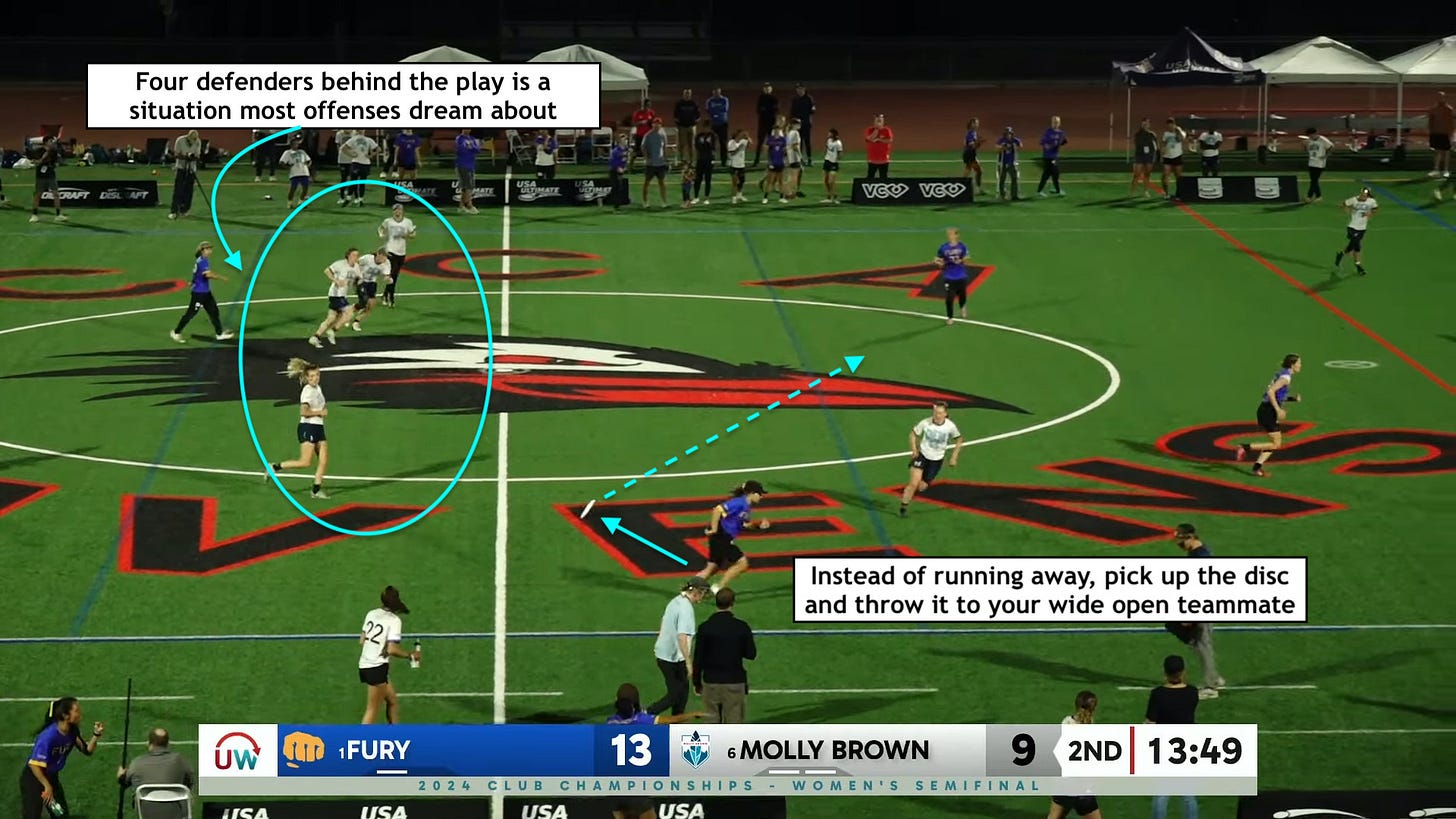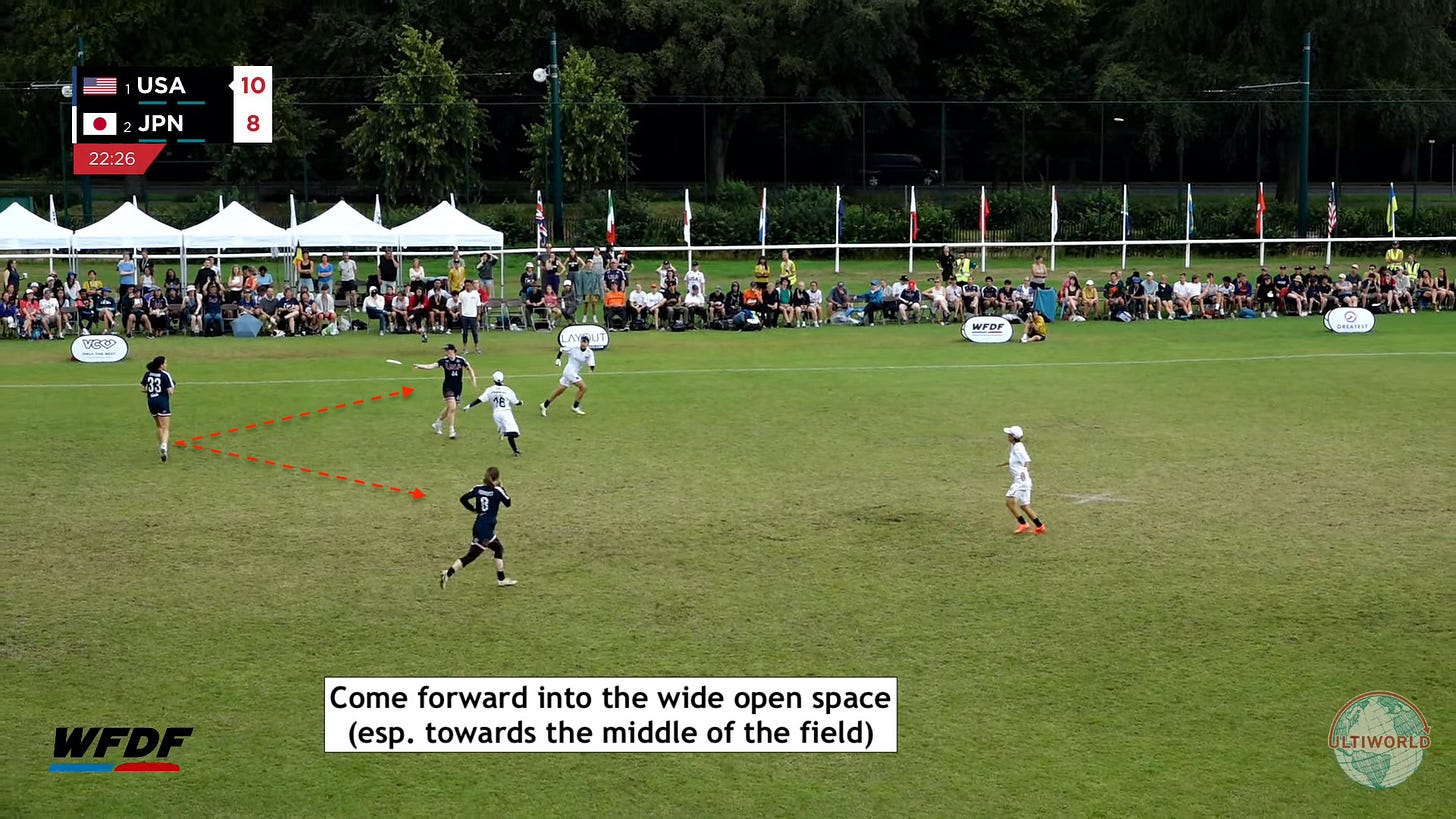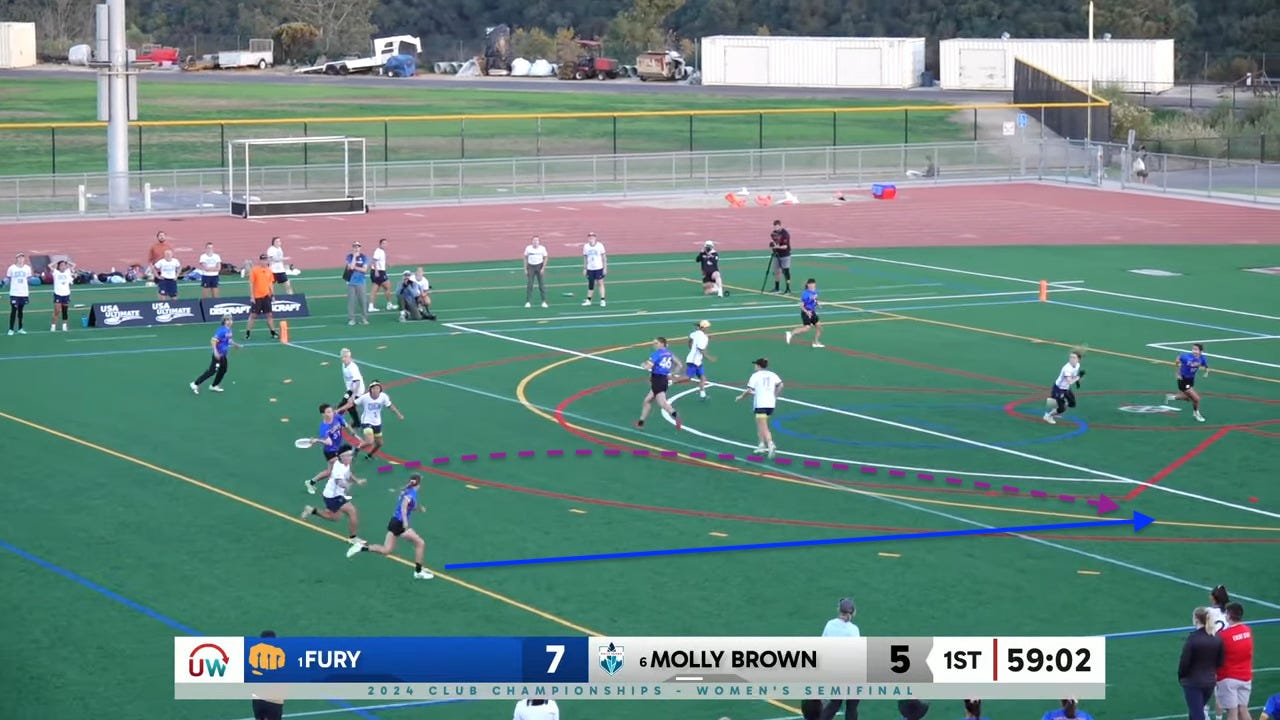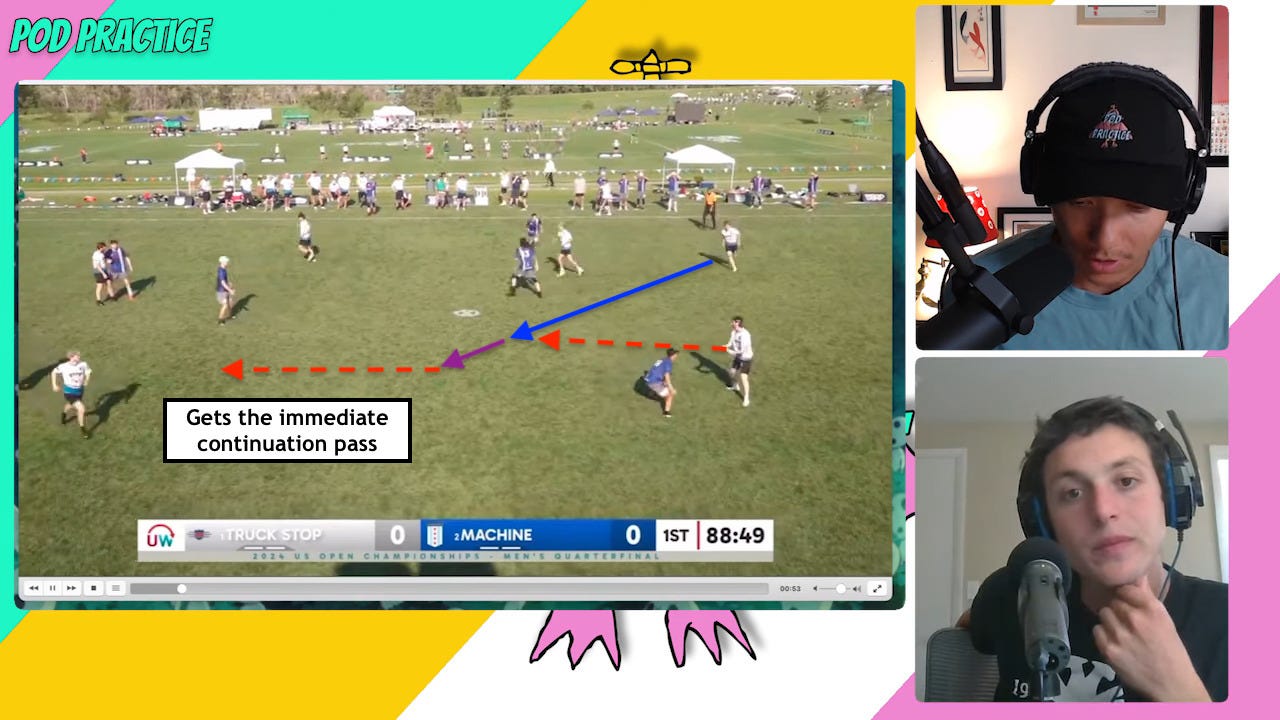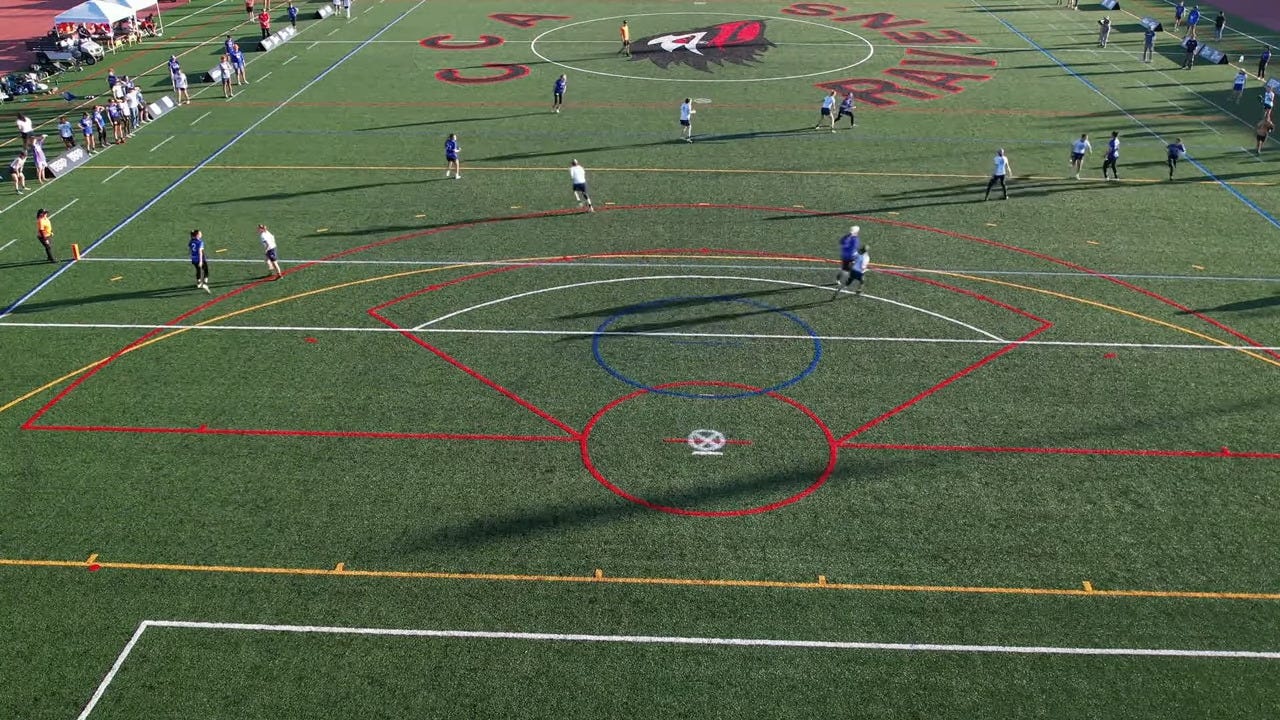Organizing my thoughts on playing offense
Some bullet points on getting the disc to the endzone
I've written lots of articles discussing offense, but I don't think I've ever really put them all together. This article is still sorta all over the place—I'm not making an attempt to present it all as one coherent strategy—but at least it's collected the ideas that feel most important to me playing offense at this moment in my career.
See also: How do you actually beat a zone defense?.
Please let me know if I've missed anything!
Here's a summary of what I believe works on offense:
Good offense comes from good frisbee players. The perfect horizontal stack cutting pattern won't make up for a team's lack of individual skills. Having skilled players with the variety of throws, the release speed, the catching ability, the cutting know-how to notice and attack open spaces, etc etc is more important than the offense's shape.
In some ways, this bullet point is as important as all the others combined. You won't be a Nationals-level handler if you don't have a Nationals-level handler's throwing skills. Work on your game, and find teammates who'll do the same.Fast breaks allow the offense to seize a naturally-occurring advantage. Pick up the disc quickly after a turn, as much as possible. The best results come when you see a turnover happening and start playing offense before your team even has the disc.
Similarly, good offenses take every advantage they can when fielding the pull. The best time to play offense is when the defense isn't even there yet. Catch every pull you can and then get as many free yards as possible. (The importance of this varies depending on what level you play at). To use an American football metaphor, some teams act like the pull is a kickoff and the next thing that happens is running a set play on 1st & 10. But that's forgetting something: the first thing that actually happens after a kickoff is the kick return, an all-out dash to gain as many yards as possible, as quickly as possible.
Give-and-gos will never not be a good strategy. (They take advantage of a few key ideas: (1) the mental time it takes a defender to transition from "mark defender" to "cutter defender"; (2) the fact that a mark defender is on the wrong side (relative to the force) once the player they're guarding no longer has the disc); (3) Acceleration from a stop is a good way to generate separation)
Playing with speed—moving the disc with speed—is critical to staying ahead of the defense when the offense has generated an advantage. Cut early and be ready to throw as soon as you've caught the disc. This is important both as an individual skill and as a team-level strategy. I'll be writing more about this soon.
Predictability is not a good thing for an offense. If everyone on offense knows you're about to cut from the back of the stack, everyone on defense surely knows that, too. And they'll use that information to make offense harder for you. Of course, offenses don't want pure chaos, either. But they need enough unpredictability to keep defenses on their toes.
Yards matter: use your field awareness to avoid losing any more yards than necessary. All other things being equal, be aggressive about making forward progress—being closer to the endzone where you score is, all other things equal, better…
...but at the same time, yards don't matter. Backwards passes are a super important part of frisbee. They change the angle of attack and keep the disc moving, which keeps the defense a step behind. They get the disc away from the sideline before the D gets set and being on the sideline becomes a problem. Etc etc. Catching the disc and immediately looking downfield for the next five seconds is the hallmark of someone who doesn't quite understand how to actually play frisbee yet.
Offense happens when your team has the disc, so good offensive players make an unselfish commitment to not turning the disc over. Jonny Malks and Rowan McDonnell say Truck Stop's offense kind of just... came out of a decision to not throw turnovers (see: 1:16, 10:20). Obviously there's a lot of nuance here—not turning the disc over is more than just a mindset—it's having the throws to get the disc to your teammates, and so many other skills besides. But I do think a fair amount of what makes a player good is a healthy obsession with understanding exactly how to use their skills to maximize the probability of getting the disc in the endzone before it's turned over.
To put it another way: you should generally do easy things, not hard things. Again, the story is more nuanced than that—you develop your skills in order to make things easy that used to be hard—but the general idea feels right to me. There's a certain satisfaction people get from throwing a nice inside break, or a nice deep shot. And sometimes those throws are actually necessary and are the best option. But given a choice between doing easy things and scoring or doing hard things and scoring, pick the easy things every time.
Hating turnovers doesn't mean I *hate* deep throws. After all, the endzone is the only place where catching the disc earns you a point. Good offensive players understand that. But they also understand that good defensive players know it, too. Deep cuts work best as a threat to force the defense to commit to stopping an easy score. But there are also lots of defenders who don't fully appreciate the importance of guarding the endzone (there's still alpha in help defense), and sometimes you have to actually make good on those threats and burn a defender who's giving you a little too much access to the endzone.
Punish poaches promptly: good throwers and good cutters have a healthy obsession with immediately taking advantage of defenders who dare to play too much help defense. (Notice when you're open, for example).
A core skill with the disc in your hand is being able to get through multiple "reads" quickly (even simultaneously). A good basketball player is expected to be able to make split-second decisions between shooting, dribbling, and passing to any of 4 teammates. A great thrower can do the same, seeing the whole field more-or-less at once and hitting a teammate as soon as they get open. Build the ability to see the whole field and not be solely focused on one location/teammate.
"Gravity" is an important concept in frisbee just like it is in basketball. In my mental model, gravity in frisbee is something of an opposite to gravity in basketball: while Steph Curry's gravity keeps defenders near him, a good frisbee thrower has "anti-gravity": the more spots on the field you can reach as a thrower, the fewer opportunities a defense has to sag off and play help defense. This opens up space to make cutting easier for everyone. If a defender knows your throws can't reach a particular part of the field, they'll feel that lack of gravity and will hedge towards the more threatening parts of the field.
(Good cutters have gravity, too, but my current opinion is cutter gravity is generally subtler.)In other words: a good defender knows to ignore non-threats, so a good offensive player knows to always be threatening. (This version applies to cutters more than throwers, perhaps)
Find opportunities to catch the disc with momentum towards the break side, or with positive momentum (towards the goal you're scoring in). The big downsides of catching an "under" are that (a) you're facing the wrong way and (b) your momentum is taking you even further from the goal you're trying to reach.
Offenses like space (putting your whole offense in the endzone is bad, actually), and defenses like cramping space. Know how to spread the field out to keep your defender far from the action. Sometimes the best thing to do is to give your teammates space to cook.
Cutting is not just about making V-shaped patterns (sadly even some high level players haven't fully figured this out) , it's about understanding how to use your defender's momentum against them to generate separation. Start fast when you're both standing still, stop when you're both running fast, stop and start again while they're still slowing down. Etc etc. Cutters who really know what they're doing have a "herky-jerky" quality to their motions that less effective players lack. Go play tag until you really understand how to get away from someone who's chasing you.
A surprising amount of offensive effectiveness can be generated by understanding what your defender does and doesn't know. Knowledge is power. Can you hide your intentions from a faceguarding defender until you make a well-timed cut? Can you throw passes to space that take advantage of a downfield defender who doesn't know where the disc is? Can you find the spots on the field where it's hard for your defender to see you and the disc? A lot of "cheeky" or "high IQ" plays come down to understand what defenders don't know.
Subterfuge: Building on the theme of knowledge, good offensive players will even cause their defenders to believe things that aren't true about their intentions—look off defenders when you have the disc, use fake hand signals, act like you're bored standing still before exploding into a cut. Understand your defender's expectations...and then break them.
Great players have edge. They want the disc, they want to score, they want to run their defender into the dust. Having that edge can make up for a lot in comparison to a player who's more technically proficient but doesn't play like they're doing everything possible to win.
(That doesn't mean being an asshole! You can try your hardest to win fairly & without being a jerk. Play your hardest out of love for the game, as suggested by a philosopher of games. I'll score on you relentlessly if I can, but I'll try my honest best to never cheat in order to do it.)Good offense never stops, especially mentally. Be ever-ready to get the disc—clear out, don't check out. Playing offense (or defense!) is an unending process of searching for opportunities. Notice things, process them, notice more things, and once you've found an opportunity, seize it. (And, over the years, learn to recognize more of those opportunities, more quickly)
Let me know if it feels like there's something important I've missed!
